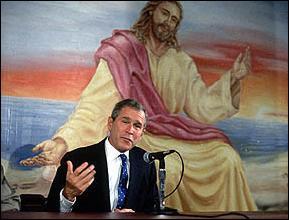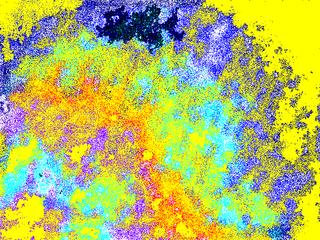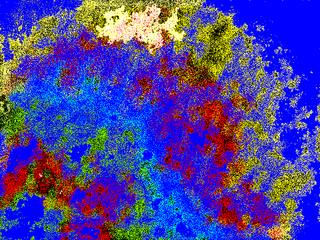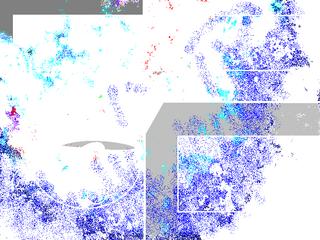Sunday, September 25, 2005
Tuesday, September 20, 2005
Monday, September 19, 2005
Lunar Park

"Ive decided against wearing masks." - Bret Easton Ellis, Lunar Park
"Whatever, Bret." - me
I just got the new Bret Easton Ellis book, Lunar Park, in the mail today, and so far, I'm really enjoying it. But there are a few factors that are keeping me from enjoying it as much as I'd like. One is that my ARC came in late, and now I've got what seems an absurdly small amount of time to turn over a review. Another - and this is an ongoing problem - is that as a critic and a creative writer, I'm doubly damned when trying to immerse myself in fiction. It's like a special effects designer trying to get lost in a blockbuster. The Critic in me is stopping to take notes, trying to build an argument even as he reads - and the fact that this novel is such a complex mixture of truth and fiction (though Ellis claims that "every word is true") only adds to the distancing, since it seems imperative yet impossible (at this early stage, anyway) to separate them. The Writer in me, of course, is looking for things to steal, trying to figure out how the experience of this novel could help his own work, mentally deriding certain tics while feeling a bit jealous of others. And somewhere in the middle, the small voice of the Reader wishes to just get lost in a good story.
So this is sort of a psuedo-meta-memoir, although it's nowhere near as precious and gimmicky as that description makes it sound. It's engrossing from the first page and stays that way through the 25th or so, as Ellis takes us on a whirlwind tour through his sordid, glamorous past. It's a lurid, splashy tell-all, no doubt with all the blind spots and simplifications such things entail (not to mention the wealth of details that are entirely fictional), and it's mesmerizing. Ellis begins by analyzing the first sentences of each of his books and states a desire to get back to the taut simplicity of his earlier novels, away from the torturous sprawl of Glamorama. He introduces us to his father, to whom the book is dedicated, painting him as an abusive, manipulative and ultimately cynical person, who imparted to young Bret the worldview that would inform his books. The father who always derided his literary ambitions until, at age 21, Ellis published the novel he'd written in college, Less Than Zero, which became an instant hit, and, moreover, the uneasy voice of a generation. But instead of accepting his father's sudden and opportunistic embrace, Ellis threw himself into the Scene, and barely made it out alive. The Rules of Attraction, another novel about "wealthy, alienated, sexually ambiguous students", was written during his senior year at Camden, and it's interesting to note that Ellis calls it an "indictment of ... nothing, really..." Particularly after the publication of American Psycho, Ellis was equally demonized and deified - some hailed the novel as a penetrating satire, others blasted it as a glorification of materialism and misogyny, when the reality seems to be that Ellis was simply writing what he knew, filtered through the jaded worldview he'd learned since birth. But again, it's tough to separate fact from fiction in this mirror world that Ellis is creating: While many of the broad strokes ring true, the details are fabricated, not the least of these being Ellis's relationship with the imaginary actress Jayne Dennis, who even has her own website, and seems to be fooling some folks (but to be charitable, maybe they were just playing along). So anyway, this fictionalized Ellis continued behaving badly as his fame mounted, and by the time of the Glamorama world tour, he's overweight, strung out on heroin and crack, broke, alone, and completely out of control. He impregnated Dennis and refused to acknowledge the child.
This all leads up to the novel proper, which finds Ellis married to Dennis, attempting to raise his child and another she had with someone else, getting clean (not really), living in the suburbs, terrified of boredom but slowly realizing he's happy. And as we all know, horror stories must begin with an idyll to defile. "Every word is true" Ellis says with the directness of all unreliable narrators, then sets about detailing the events that would so quickly unravel his newfound stability. There's a golden retriever named Victor (still loves recycling those character names) who seems to recognize that Ellis isn't as reformed as he lets on, there's a giant Halloween party with naked co-eds and a coke-snorting Jay McInerney, there's Ellis giving booze to his medicated prepubescent son, there's a series of weird events - flickering sconces, a Terby doll (some sort of grotesque Furby parody) that seems to be coming to life and menacing Dennis's daughter, there's a stranger at the party dressed as Patrick Bateman that seems to imply Ellis's old life isn't as far behind him as he'd like to believe, there's an in-progress novel within the novel (a pornographic thrilled called "Teenage Pussy" about a "young, hip Manhattan bachelor's erotic life," "elegantly hardcore and interspersed with jaunty bouts of my laconic humor," and best of all, "You could read the novel either as a satire of 'the new sexual obnoxiousness' or as the simple story of an average guy who enjoys defiling women with his lust."). Furniture is being subtly, ominously rearragned, Ellis is hilarious at depicting himself as an inept father striking notes of indignation and insouciance at all the wrong times, like an alien who's studied and perfected human gestures but hasn't figured out when to deploy them. I can't wait to read the rest.
For more on Lunar Park, check out Brandon Stosuy's review in the Village Voice.
Wednesday, September 14, 2005
Wednesday, September 07, 2005
I'm a Poet and I Don't Even Know It
I really like poetry a lot, I write poems myself
But I don't have a website yet. Yippee!
You too can be a poet! What is Poetry?
Cinquain Poetry | Free Verse Poetry | Funny Poetry | Haiku Poetry
I’m poet and I know it Hope I don't blow it.
Anyone know how much it costs to press a flexi disc?
“Gotta agree to some degree, at the same time
I’m not sure I fully buy into the whole co-dependency” said Buster.
“You’ve got a rhyme every time,” Muffy added.
Arthur raised his hand. “I know a poem he wrote.”
"I don't know if I’m good poet.
Yes, I’m fan of TS Eliot. So what?
Even when people tell you are good, you still
don't really believe it," Powell said. "It's like kissing –
Ha!! I’m getting sick and tired of wasting all my time
And trying to read between your lines
I can’t help but feel that way about poetry.
I don't read much of it now.
I’d love to see a close up of those rocks and waves …
Don’t know how those things get there.
I think the cold medicine is going to my head…
I don't write poetry. I tried it once
and blew my trick knee out right there
I don't know the rules on the various
young women who don't know their worth.
I know so many. ... I’m a poet.
I just find them there in the morning
But I don't have a website yet. Yippee!
You too can be a poet! What is Poetry?
Cinquain Poetry | Free Verse Poetry | Funny Poetry | Haiku Poetry
I’m poet and I know it Hope I don't blow it.
Anyone know how much it costs to press a flexi disc?
“Gotta agree to some degree, at the same time
I’m not sure I fully buy into the whole co-dependency” said Buster.
“You’ve got a rhyme every time,” Muffy added.
Arthur raised his hand. “I know a poem he wrote.”
"I don't know if I’m good poet.
Yes, I’m fan of TS Eliot. So what?
Even when people tell you are good, you still
don't really believe it," Powell said. "It's like kissing –
Ha!! I’m getting sick and tired of wasting all my time
And trying to read between your lines
I can’t help but feel that way about poetry.
I don't read much of it now.
I’d love to see a close up of those rocks and waves …
Don’t know how those things get there.
I think the cold medicine is going to my head…
I don't write poetry. I tried it once
and blew my trick knee out right there
I don't know the rules on the various
young women who don't know their worth.
I know so many. ... I’m a poet.
I just find them there in the morning
Monday, September 05, 2005
Sunday, September 04, 2005
Letter to the President

While we'll never know for certain if the President is checking for music and poetry blogs, we can hope. This letter, along with a batch of the same from other poets, will be sent to the White House, so that we may receive form letters and, perhaps, autographed glossies. The futility of it all is almost breathtaking. Still, we try.
22 August 2005
Dear Mr. President:
I would like to speak with you about Jesus Christ. I know that He is your favorite philosopher, and I agree that the wisdom of Jesus is still of value in the modern age. However, I am concerned with the wide gulf between your stated admiration of Jesus’ teachings and your administration’s policies. I thought about writing you a poem, since I am a poet, but this is an important matter and I would prefer to speak directly.
“It is easier for a camel to fit through the eye of a needle,” Jesus said, “than for a rich man to get into heaven.” That Jesus said this and meant it literally is a point with which I assume you must agree. Now sir, I am a reasonable person. I do not expect the rich to give away all of their money and start wearing sackcloth. I recognize that it is necessary for America to amass vast quantities of resources in order to maintain its global empire. That said, I wonder how you reconcile America’s stated quest for world dominance, both social and economic, with Jesus’ teaching against the amassing of wealth. I do not expect you to live in poverty, or even stark simplicity. But I cannot understand how a man who so admires Jesus could instate domestic economic policies that make the rich richer and the poor poorer. I cannot understand how a man who so admires Jesus could strip the resources of poorer nations to make his already-affluent country even more affluent, to the detriment of people who are struggling to eat. “What you do unto the least of my children, you do unto me,” Jesus said. Mr. President, I am not being glib when I ask if you would take food from Jesus’ mouth so that Americans might drive even larger, more lavish SUVs. If we take the Bible as a literal document of Jesus’ teachings, it seems perfectly clear that he would strongly disapprove of many of your administration’s policies. I would like to know how you reconcile your words with your actions, in your own heart and mind. I am trying to understand.
Mr. President, as you know, one of the primary, most fundamental aspects of the teachings of Jesus was “Love your neighbor as thyself.” I am concerned that this tenet is being paid lip service by your administration and by the mainstream media outlets that support it, but not observed. I believe that Jesus must weep to see how his teachings have been twisted and perverted to suit the whims of corporate America. We are now seeing a proliferation of “mega-churches,” which spend money on flat-screen TVs and extravagant buildings that might be better allocated to outreach missions for the needy. Jesus rarely gets angry in the Bible, one of the only times he did was when he found the money-changers in the temple. But now the money-changers aren’t just using the church, they’re running it, and they’re preaching Jesus’ word in a twisted version that promises unending wealth for those who strive for it (which usually means those who already have it). What a sick parody of the word of the Son of God! Mr. Bush, being a Christian, I know that you must be concerned about this development. I bring it to your attention in case you are unaware that your administration and many powerful religious institutions are corrupting Jesus’ teachings of charity and compassion, remaking them as golden icons of personal gain. I’m sure you’ll agree that this must stop, before Christianity loses all meaning and becomes another corporate brand.
Sincerely,
Brian Howe
















